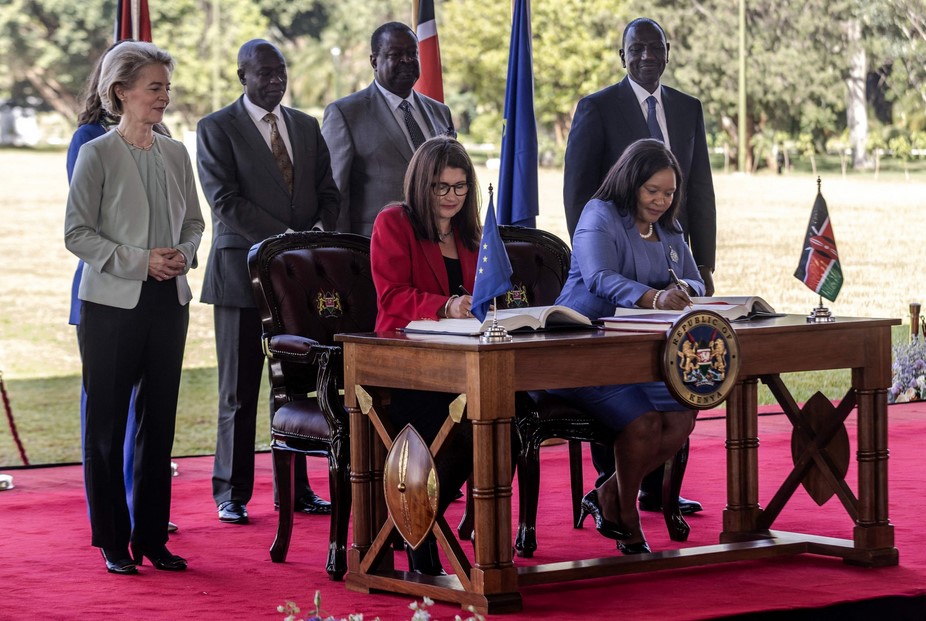
On Monday, Kenya and the European Union finalized a long-debated trade agreement aimed at boosting the exchange of goods between the two markets. This move aligns with Brussels’ efforts to strengthen economic connections with Africa.
The Economic Partnership Agreement establishes duty-free and quota-free access for Kenya to the EU, its largest export market, while concurrently implementing progressive tariff reductions for European goods.
Marking the first comprehensive trade accord between the EU and an African nation since 2016, this agreement follows China’s substantial investments in opulent infrastructure projects throughout the continent. During a ceremony in Nairobi, attended by European Commission chief Ursula von der Leyen, Kenyan President William Ruto expressed optimism, stating, “Although today represents a moment of monumental promise, it is also the beginning of a historic partnership for historic transformation.” Ruto emphasized the fundamental goal of the deal—to infuse tangible benefits into the lives of ordinary citizens.
President Ruto’s sentiment was echoed by EU chief von der Leyen, who described the partnership as a “win-win situation on both sides.” She urged other East African nations to consider joining the pact, emphasizing the collaborative nature of the agreement. The successful conclusion of years of negotiations in June culminated in this pivotal moment for EU-Africa relations.
“We are deepening trade ties and building up our economic resilience,” she said. “We are opening a new chapter in our very strong relationship and now our effort should be focused on implementation,” von der Leyen added. Both the Kenyan and the European parliaments must ratify the deal before it comes into force.
The European Union said that the deal was “the most ambitious economic partnership” it had with a developing country. It includes commitments to sustainable development in areas such as labour rights and environmental protection, the EU said in a statement.
“A dedicated chapter has been included on economic and development cooperation, aimed at enhancing the competitiveness of the Kenyan economy,” the EU said. EU’s trade commissioner Valdis Dombrovskis said the “historic agreement” would unlock new areas for cooperation and benefit.
The 27-nation bloc accounts for more than 20 percent of Kenya’s overall exports, according to government data, mainly agricultural products, including vegetables, fruits and the country’s famous tea and coffee. Total two-way trade between the markets hit 3.3 billion euros ($3.6 billion) in 2022, up 27 percent since 2018, according to EU figures.
– ‘A wide-open Entrance’ –
Africa has become a renewed diplomatic battleground since the Ukraine war began, with Kenya and other countries on the continent aggressively courted by Russia and China and the West. An economic powerhouse of east Africa, Kenya is seen by the international community as a reliable and stable democracy in a turbulent region.
The EU has taken steps to counter China’s Belt and Road programme, announcing in February it would increase investments in Kenya by hundreds of millions of dollars through its own Global Gateway initiative. Kenya’s biggest infrastructure project, a $5 billion railway line connecting Nairobi to the port city of Mombasa, which opened in 2017, was built by a Chinese company with Chinese financing.
Kenya is also negotiating a trade deal with the United States. The new trade deal with Europe is the culmination of trade talks between the EU and the regional East African Community (EAC) that started roughly a decade ago. Kenya signed and ratified an initial trade agreement with the EU in 2016 alongside the EAC but it fell through after some countries failed to greenlight the pact, with Kenya eventually pursuing its own deal.
“This agreement leaves the door wide open for our EAC partners to join so that together as a region we can benefit,” Ruto said.





